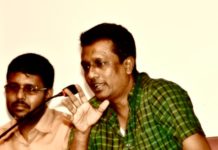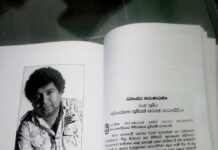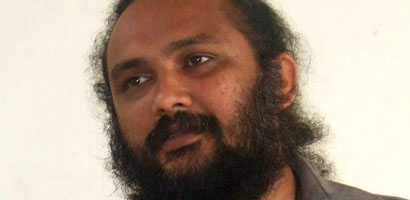කුඩා කාලයේ සිට පීතෘ වියෝග කාංසාවට මුහුණ දෙන ඇන්ටනි චිත්තාවේගීය වශයෙන් අසමබර වේ. ළදරු වයසේ තීරණාත්මක කාලයේ සිටම පීතෘ ප්රතිබිම්බය ග්රහනය කිරීම ඇන්ටනි තුල ප්රමාද වෙයි. එම නිසා කුඩා කාලයේ සිට වැඩිහිටියෙකු දක්වා ඇන්ටනි මානසිකව වර්ධනය වන්නේ අභ්යන්තර මානසික ගැටුම් සමගය. මෙම අභ්යන්තර මානසික ගැටුම් අන් අය සමග ප්රශස්ථ සබැඳියාවන් ගොඩනගා ගැනීමට යාමේදී ඇන්ටනි තුල ඝට්ටනයක් ඇති කරයි . මේ නිසා ඔහු මානසික හුදකලාභාවයකට ලක් වේ. පීතෘ වියෝගය ඔහුගේ විශ්වාස පද්ධතිය තුවාල කොට තිබේ. මේ නිසා ඔහු ගැඹුරු මානව සම්බන්ධතා ගොඩ නගා ගැනීමට බියක් දක්වයි.
තමන් ගේ මානසික හුදකලාභාවය නිසා වෙනසක් අපේක්ශා කරන ඔහු පියා සොයාගෙන බත්තලංගුණ්ඩුව දිවයිනට යයි. මෙහි සංකේතාත්මක අර්ථය වන්නේ තමන් ගේ මූලයන් සොයා යළිත් මවගේ ගර්භාශයට යාමට ඔහු දක්වන අවිඥානික යොමුවයි. කල්පිටිය මුහුද නැමැති ගර්භාශික තරළය (amniotic fluid) හරහා ඔහු බත්තලංගුණ්ඩුව නම් ගර්භයට සැපත් වෙයි.
බත්තලංගුණ්ඩුවේදී ඔහුට පියා හමුවේ. නමුත් දෙදෙනාගේම හැඟීම් නිර්වින්දනය වී තිබේ. පුරා දීර්ඝ කාලයක් මානසික බැඳීම් වලින් තොරව දුරස්ථකරණයට ලක්ව සිටි පියා සහ පුතා එකිනෙකාට ආගන්තුකයෝ වෙති. කුඩා නෝවා දකින ඇන්ටනි තුල සිබි ප්රතිවිරෝධයක්ද (sibling rivalry) ඒ හා සමගම සහෝදර ඇල්මක්ද හට ගනියි. මෙම පරස්පර ප්රතිරෝධය ඇන්ටනි තුල පවත්නා අවිඥානික මානසික ගැටුම් නිසා හට ගන්නකි.
ඇන්ටනිගේ අවිඥානික මාතෘ සංකේතය වන්නේ ආන මරියාය. මොවුන් දෙදෙනාගේ සහ සබඳතාව එක්තරා දුරකට මර්සෝ සහ මරීගේ සබඳතාවට සමානය.ඇන්ටනිද පිටස්තරයෙකි. බයිබලයේ දැක්වෙන මුහුද දෙබෑ කරගෙන එන අං දහයක් සහ හිස් සතක් ඇති මෘගයා ඔහුය.
අපවර්තිත ඊඩිපස් සංකීර්ණයේ ශේෂයන් නිසා ඇන්ටනි තුල නෛසර්ගික සමරිසි නැමියාවක් තිබේ. මෙම නෛසර්ගික සමරිසි ආනතිය ප්රකාශ වන්නේ පියා කෙරෙහි දක්වන ලිංගික ඉර්ශියාව මගිනි. එම ලිංගික ඉර්ශියාව විසින් තත්ය ලෙසින් හෝ මනස්ඍෂ්ටියක් මගින් හෝ ග්රේටාව අතික්රමණය කරනු ලබයි.
වෛද්ය රුවන් එම් ජයතුංග
;;;;;;;;;;;;;;;;;;;;;;;;;;;;;;;;;;;;;;;;;;;;;;;;;;;;;;;;;;;;;;;;;;;;;;;;;;;;;;
Psychoanalytic reading of Baththalangunduwa
Dr Ruwan M Jayatunge
Manjula Wediwardene’s Baththalangunduwa is an inaccoutumé novel which gives an astounding experience to the traditional Sinhala readers. This novel discusses maladjusted family relations, paternal deprivation, and nostalgia of a social drifter. Baththalangunduwa has become a juncture in the modern Sinhala literature.
The protagonist of the novel is a young man named Anthony who is a social outcast. He was ostracized and shunned by his peers. He becomes a lonely man who has no specific aim in life. Anthony’s wistfulness was resulted by the paternal deprivation (prolonged separation of the offspring from the father). His sense of trust, safety and attachment were deeply affected by the paternal deprivation that he experienced in his early life.
Paternal deprivation is an overwhelming experience and it can cause anxiety, attachment problems and affects personality structure exceedingly. It has been identified as a severe life stressor. According to Veenema & Neumann (2009) early life stress is a risk factor for altered adult emotionality including impaired social behavior, enhanced aggression and violence. These behavioral deficits most likely have an earlier onset in life.
Early paternal deprivation significantly affects offspring behavioral and neuroendocrine development (Wang et.al, 2012). Some experts are of the view that adult attachment styles and personality disorders share a common underlying structure. Some believe that childhood trauma could cause personality disorders in adults.
Anthony who has become a victim of paternal deprivation shows a series of emotional and behavioral disturbances since his school going age. His personality traits were affected by unresolved childhood conflicts, neuroticism, and separation anxiety. Anthony’s inner psychic conflicts resulted from cold parenting and it lead to a failure to develop stable object constancy. He has serious attachment problems and unable to establish secure – healthy relationships.
Trust versus Mistrust is an important stage in psychosocial development. Anthony’s trust was shattered and it had caused lasting impact on his personality. The culmination of his intra psychic conflict denotes by his decision to meet his father who had left him long ago. Still he has strong feelings for his father. Anthony decides to meet his originator in strange circumstances. He goes to meet his father who lives in a remote fishing island -Baththalangunduwa.
His trip to Baththalangunduwa is an escape from his tedious life. It is an escape from reality. He waited a long years for his father to return. But he never came. Now Anthony needs a dramatic change in his life by meeting with his father.
The book describes the conversation between Anthony and two Navy officers at the pier just before he gets into a boat to go to Baththalangunduwa.
I lit up a cigarette and walked towards the Jetty. I saw two navy petty officers checking the identity cards of the passengers. Soon my turn came.
Where to ? One Sailor asked with an authoritative voice.
To Baththalangunduwa I replied
For What purpose?
For a change
(Bathhalangunduwa page 17)
Anthony needs a change, a dramatic transformation, escape from reality and enter in to another dimension. Bathhalangunduwa is going to be his next destination. His self exile offered no salvation. He lived a life of a drifter until he decided to meet the father. He expected this trip to be a resurrection.
The reader captures a close connection between Anthony and Meursault – an outlandish character created by Albert Camus. Both these characters share one common world – the world of indifference. Anthony is torn between paternal deprivation and repressed hostility towards the father. He does not seek any revenge but needs answers. Like Meursault Anthony has no specific aim in life. Both are affected by cynicism.
Anthony meets his father in the island. There were no welcome signs. Unpredictably it was a cold encounter that hurts his inner feelings.
I thought he was surprised to see me. But he did not. My expectations were crumbled. He was indifferent and emotionless. These feelings may be stemming from father’s powerful personality that is capable of concealing emotions. It makes me angry and embarrassed. I need to obscure my emotions, but how?
So why did you come? He asked.
I need to combat my anxiety. In order to get rid of my unease feelings I took a cigarette from the pack.
(Bathhalangunduwa page 49)
……………. So why did you come?
He looked in to my eyes. I looked away evading his eye contact
I just came to see you
(Bathhalangunduwa page 51)
It was a pleading agony from a son who wants his father to accept him. The fear of abandonment was the central factor that troubled Anthony for many years. The mother had been dead for a long time. Although she is dead Anthony has a few childhood memories of his mother. Some memories are still hounding him. The reminiscences of the maternal figure had been faded. He frantically expected his father to be near him, embrace him. He grew up expecting his father to return someday. But he never returned. Anthony grew up with the empty space. He expected his father to fill it someday. But he was disappointed.
When Anthony came to the island he found that things have been changed over the years. His father has a young wife and a child. Anthony finds a huge wall that prevents him to get close to his father. The empty space is getting wider distancing him from the paternal image. The emotional anesthesia between father and son grows more than ever. He can never be a part of that family. Again he has become an outcast. Now his intentions have changed. Anthony needs to escape from his deliverer and his creator. He needs to run away from the island.
I am going tomorrow morning. I said very persuasively.
But he did not pay attention to my words.
Tomorrow is Sabbath Day. No one goes to the sea on Sabbath Day. So you ought to stay in the island tomorrow. Father replied.
How can I live in this prison for two days?
Although I muttered these words he could hear my whisper. He responded while setting on a log and giving at a glance.
Life is a prison
(Bathhalangunduwa page 52)
This is a paradox. The man who gave life to Anthony states that life is a prison. He has been in life imprisonment without the possibility of parole. It was a heartbreaking feeling for a person who has realized that he is trapped for life. Recall the words of Robinson Crusoe (by Daniel Defoe) when he realizes his life is entrapped in a tiny island and he has become a cast away. Crusoe says to himself “I could not forbear getting up to the top of a little mountain, and looking out to sea, in hopes of seeing a ship: then fancy that, at a vast distance, I spied a sail, please myself with the hopes of it, and, after looking steadily, till I was almost blind, lose it quite, and sit down and weep like a child, and thus increase my misery by my folly.”
Although Anthony does not cry his inner feelings are devastated. His trust was shaken. The father’s image was his personified friend for a long time until he came to the island called Bathhalangunduwa. After witnessing father’s new family his wife and the little child -Nova Anthony realized that his biological father exists no more. The father’s symbolic death is characterized by further emotional detachment and negativity. Anthony is seeking a new attachment.
When the father figure moved away Anthony finds a new maternal symbol in the island. She is Anna-Maria Anna-Maria is a young girl who fulfills his emotional and erotic desires. For Anthony, Anna-Maria is a new form of object relation. He is inclined towards Anna Maria primarily for human contact rather than for sexual pleasure. As Jacques Lacan stated “desire is neither the appetite for satisfaction nor the demand for love, but the difference that results from the subtraction of the first from the second. Lacan’s expression is fully applicable to their relationship.
The protective and tender nature of Anna-Maria reminds him the forgotten maternal symbol. The sea was the amniotic fluid in which he travelled to reach Anna-Maria. She provides him libidinal cathexis and emotional growth. Anna-Maria becomes a libidinal object in his inner world that was tormented by basic trust. The identity formation and romantic attachment has been established.
Anna-Maria gently kept her ear on my chest and started listening to my heartbeat.
“You have two hearts” she said
How come? I questioned her with mixed feelings of embarrassment, curiosity and affection.
(Bathhalangunduwa page 84)
The relationship between Anthony and Anna-Maria reminds us the association between Marie Cardona and Meursault in Albert Camus‘s the Stranger.
“She was wearing a pair of my pajamas with the sleeves rolled up. When she laughed I wanted her again. A minute later she asked me if I loved her. I told her it didn’t mean anything but that I didn’t think so. She looked sad. But as we were fixing lunch, and for no apparent reason, she laughed in such a way that I kissed her. (Albert Camus -The Stranger)
Meursault’s relationship with Marie is characterized from the beginning by an absence of verbal interaction. Their first meeting consists of activities that require little conversation: a day in the water and an evening at the movies. She spends the night at his apartment and leaves before Meursault awakes in the morning, thus avoiding a parting conversation (Strange, 1997).
There are a number of similarities between Marie Cardona and Anna-Maria. Both reflect as inexplicable characters. Anna-Maria is religious but not a religious fanatic. Although she grasps the Biblical message of love she does not consider sex is a selfish act or a conquest of personal fulfillment. For Anna-Maria love is an expression of her inner feelings and inner joy. She finds beauty in sexual copulation. Men and women are different and complement one another (Genesis 1:27-28). “Your desire shall be for your husband” (Gen 3:16). She strongly believes in these Biblical words.
For Anna-Maria life is a desire – a beautiful thing beyond her expectations. But in reality her entire universe is limited to a tiny island. In a way she is trapped and unable to escape like Marie Cardona. Perhaps the words of Salman Rushdie would better describe the entrapment faced by Anna-Maria and Anthony in Bathhalangunduwa.
“Life is fury, he’d thought. Fury — sexual, Oedipal, political, magical, brutal — drives us to our finest heights and coarsest depths. Out of fury comes creation, inspiration, originality, passion, but also violence, pain, pure unafraid destruction, the giving and receiving of blows from which we never recover (Fury by Salman Rushdie).
Anthony wants to test her Biblical knowledge. He wants to know how deep is her love for the God and for what extent she could be influenced by the Fallen Angel. Therefore Anthony asks Anna-Maria to read a selected chapter from the Bible.
Turn to the book of Revelation. The 13th Chapter
You mean a beast coming out of the sea?
Yes, read it please
And I saw a beast coming out of the sea. He had ten horns and seven heads, with ten crowns on his horns, and on each head a blasphemous name. The beast I saw resembled a leopard, but had feet like those of a bear and a mouth like that of a lion. …….
That’s enough, I stopped her. You were waiting for someone like the beast.
(Bathhalangunduwa page 90)
Anthony implies that he is the beast who came from the sea. His visit created disequilibrium in the island. Although physical relations were not taboo in Bathhalangunduwa many women in the island including Greta (his father’s young wife) do not tolerate Anna Maria’spromiscuous behavior. According to their moral standards Anna Maria is a sinner who shouldn’t be carrying the Bible. She is seductive and poisonous to the men like Anthony.
Although Greta denounced Anna Maria as a sinner she could not evade from young Anthony’s physical touch. She could not run from sexual immorality. The incest between Anthony and his stepmother signify repressed sexual conflicts in Anthony. For long years Anthony was troubled by paternal deprivation that mounted sexual jealousy in him. Was Anthony troubled by the Oedipus complex? Did he want to take revenge from his father by committing a sexual act with Greta?
Freud understood jealousy as a projection or as unconscious homosexuality, in the grammar of love that deviated from the Oedipus complex (Brodsky, 2002). Freud on his 1923 thesis : Certain Neurotic Mechanisms in Jealousy, Paranoia and Homosexuality postulates that if a ‘negative’ or ‘inverted’ Oedipus complex occurs, a boy seeks his father’s love and masculine identification by taking on a feminine identification and reverting to anal eroticism. What denotes Anthony’s sexual affiliation with Greta?
Anthony’s unresolved psychological conflict leads to social isolation, indifference and attachment problems. There is a concealed variability in Anthony’s sexual orientation and sexual preference. In other words there are repressed homosexual urges in Anthony. Some of his actions were caused by latent homosexuality. Anthony has vivid sexual fantasies. Most of his fantasies are repressed. His obscured sexual fantasies lead him to a taboo relationship with Greta – his step mother.
Describing repression in Hamlet (in 1900) Freud wrote: In Oedipus Rex the basic wish-fantasy of the child is brought to light and realized as it is in dreams; in Hamlet it remains repressed, and we learn of its existence- as we discover the relevant facts in a neurosis- only through the inhibitory effects which proceed from it. Hence Freud shows that repression leads to dramatic behavioral changes disregarding the social taboos. In Baththalangunduwa Anthony‘s repression leads to form socially unacceptable relationship with his step mother.
According to the research conducted by Leonard &Hayes (1983) the fantasy alternation can change the relative strength of physiologically measured sexual arousal patterns, but the direction and magnitude of the change seems unpredictable. While spending his time in Bathhalangunduwa Anthony undergoes series of fantasy alternations.
In the island he looks for a maternal figure. He recalls his childhood experiences associated with his mother. He realized that the father was a potential rival. He was competing with his father. There had been a marked jealousy. Anthony’s jealousy has childhood roots and it was embedded until he came to the island.
Klein highlighted the rivalry between son (the jealous individual) and father (the supposed rival) in the Oedipus complex (Shepherd, 1961). Anthony had an insecure attachment style since his childhood that was predominantly caused by sexual jealousy and deprivation.
Kingham & Gordon (2004) highlight that insecurely attached individuals, especially those of the fearful and preoccupied type, may be at increased risk of becoming anxious about their partner’s attachment to them. Insecure attachment style correlates strongly with borderline personality organization.
In humans, attachment operates through the interaction of two behavioral systems: caregiving and care-eliciting (George & Solomon, 1996). During the critical period Anthony was immensely affected by deprivation. He lacked caregiving and care-eliciting in his childhood. Following these negative psychological consequences for a considerable extent Anthony was affected by Avoidant Personality Disorder (which is characterized by feelings of extreme social inhibition, inadequacy, and sensitivity to negative criticism and rejection). His shallow attachment style, emotional numbing, and inability to form an intimate relationship with a partner forced him to move away from Anna Maria. Hence he shifted towards his step mother to fulfill his unresolved mental conflicts.
The novel ends with a family chaos. Family disorganization was caused by Anthony’s unexpected visit to the island. He came in search of his father but he did not find him. Instead of a father he found someone completely unknown. He found a rival. Anthony’s unresolved psychological conflicts lead to an ultimate mishap. The things have gone beyond repair. Greta is pregnant with Anthony’s child and the future is now uncertain.
References
Brodsky, G (2002).Symptom and Sexuation.
Camus, A (1943). The Stranger.
Freud, S. (1923). Certain Neurotic Mechanisms in Jealousy, Paranoia and Homosexuality. Int. J. Psycho-Anal., 4:1-10.
Galenson, E(1995 ). The Effect of Paternal Deprivation on the Capacity to Modulate Aggression. New Literary History Volume 26.
George, C. & Solomon, J. (1996) Representational models of attachment: links between caregiving and attachment. Infant Mental Health Journal, 17, 198–216.
Kingham M, Gordon, H (2004). Aspects of morbid jealousy. Advances in Psychiatric Treatment 10: 207-215.
Leonard SR, Hayes SC. (1983).Sexual fantasy alternationJ Behav Ther Exp Psychiatry. 14(3):241-9.
Shepherd, M. (1961) Morbid jealousy: some clinical and social aspects of a psychiatric symptom. Journal of Mental Science, 107, 688–704.
Strange, A.J. (1997). Camus’s ‘The Stranger. The Explicator. 56.1
Veenema, A.H., Neumann, I.D.(2009). Maternal separation enhances offensive play-fighting, basal corticosterone and hypothalamic vasopressin mRNA expression in juvenile male rats. Psychoneuroendocrinology. 34(3):463-7.
Wang J, Tai F, Yan X, Yu P.(2012).Paternal deprivation alters play-fighting, serum corticosterone and the expression of hypothalamic vasopressin and oxytocin in juvenile male mandarin voles. J Comp Physiol A Neuroethol Sens Neural Behav Physiol.787-96.




















